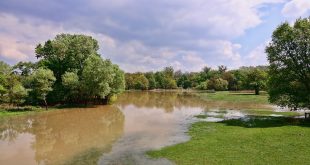The members of the IMT Digital Fund – IGEU, IMT and Fondation Mines-Télécom – held a meeting on 17 November. During the meeting, three start-ups from the Télécom Paris incubator were selected to receive support through seven honor loans for a total sum of €120,000.
Read More »Search Results for:
Arsenic contamination of water: Detection and treatment challenges
Arsenic contamination of water, whether surface water or ground water, affects many parts of France. Such contamination may be the result of anthropogenic causes, linked to mining operations for example, or of natural causes in relation to changes in geological formations, as is the case in many countries such as India, Pakistan and Chili. In partnership with the Nuclear Materials …
Read More »Agricultural sediments transported by rivers
The QuASPEr project studied the Canche river basin in northern France to better understand the phenomenon of soil erosion and its related consequences. This knowledge aims to develop effective land management methods for municipalities without negatively affecting farmers’ work. Heavy rain, dry land, sloping ground that has been tilled… and the soil erodes. This phenomenon of abrasion, in particular …
Read More »Digital technology, the gap in Europe’s Green Deal
Fabrice Flipo, Institut Mines-Télécom Business School Despite the Paris Agreement, greenhouse gas emissions are currently at their highest. Further action must be taken in order to stay under the 1.5°C threshold of global warming. But thanks to the recent European Green Deal aimed at reaching carbon neutrality within 30 years, Europe now seems to be taking on its responsibilities and …
Read More »The automatic semantics of images
Recognizing faces, objects, patterns, music, architecture, or even camera movements: thanks to progress in artificial intelligence, every plan or sequence in a video can now be characterized. In the IA TV joint laboratory created last October between France Télévisions and Télécom SudParis, researchers are currently developing an algorithm capable of analyzing the range of fiction programs offered by the national …
Read More »Covid-19 Epidemic: an early warning signal that we’ve reached the planet’s limits?
Natacha Gondran, Mines Saint-Étienne – Institut Mines-Télécom and Aurélien Boutaud, Mines Saint-Étienne – Institut Mines-Télécom This article was published for the Fête de la Science (Science Festival, held from 2 to 12 October 2020 in mainland France and from 6 to 16 November in Corsica, overseas departments and internationally), in which The Conversation France is a partner. The theme for this year’s …
Read More »How will we interact with the virtual reality?
The ways we interact with technology change over time and adapt to fit different contexts, bringing new constraints and possibilities. Jan Gugenheimer is a researcher at Télécom Paris and is particularly fascinated by interactions between humans and machines and the way they develop. In this interview, he introduces the questions surrounding our future interactions with virtual reality. What is …
Read More »COVID-19: contact tracing applications and new conversational perimeter
The original version of this article (in French) was published in the quarterly newsletter of the Values and Policies of Personal Information Chair (no. 18, September 2020). On March 11, 2020, the World Health Organization officially declared that our planet was in the midst of a pandemic caused by the spread of Covid-19. First reported in China, then Iran and …
Read More »5G: what it is? How does it work?
Xavier Lagrange, Professor of network systems, IMT Atlantique – Institut Mines-Télécom 5G is the fifth generation of standards for mobile networks. Although this technology has fueled many societal debates on its environmental impact, possible health effects, and usefulness, here we will focus on the technological aspects. How does 5G work? Is it a true technological disruption or simple an improvement …
Read More »Trains made with recyclable parts
The Destiny project proposes a new process to manufacture parts for the railway and aeronautical industries. It uses a thermoplastic resin, which enables the materials to be recycled while limiting the pollution associated with manufacturing them. It is increasingly critical to be able to recycle products so as to lower the environmental cost of their production. The composite …
Read More » I'MTech L'actualité scientifique et technologique de l'IMT
I'MTech L'actualité scientifique et technologique de l'IMT









